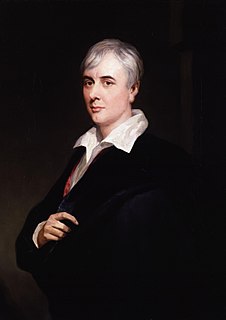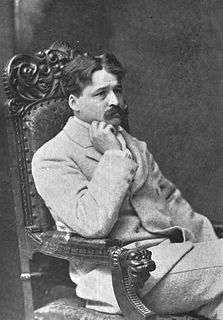A Quote by Henry Wadsworth Longfellow
Every man has his secret sorrows which the world knows not; and often times we call a man cold when he is only sad.
Related Quotes
In the lives of the saddest of us, there are bright days like this, when we feel as if we could take the great world in our arms and kiss it. Then come the gloomy hours, when the fire will neither burn on our hearths nor in our hearts; and all without and within is dismal, cold, and dark. Believe me, every heart has its secret sorrows, which the world knows not, and oftentimes we call a man cold, when he is only sad.
Every man is of importance to himself, and, therefore, in his own opinion, to others; and, supposing the world already acquainted with his pleasures and his pains, is perhaps the first to publish injuries or misfortunes which had never been known unless related by himself, and at which those that hear them will only laugh, for no man sympathises with the sorrows of vanity.
The secret of Masonry, like the secret of life, can be known only by those who seek it, serve it, live it. It cannot be uttered; it can only be felt and acted. It is, in fact, an open secret, and each man knows it according to his quest and capacity. Like all things worth knowing, no one can know it for another and no man can know it alone.
Take the happiest man, the one most envied by the world, and in nine cases out of ten his inmost consciousness is one of failure. Either his ideals in the line of his achievements are pitched far higher than the achievements themselves, or else he has secret ideals of which the world knows nothing, and in regard to which he inwardly knows himself to be found wanting.
A poet is no rattlebrain, saying what comes uppermost, and, because he says every thing, saying, at last, something good; but a heart in unison with his time and country. There is nothing whimsical or fantastic in his production, but sweet and sad earnest, freighted with the weightiest convictions, and pointed with the most determined aim which any man or class knows of in his times.
Man... knows only when he is satisfied and when he suffers, and only his sufferings and his satisfactions instruct him concerning himself, teach him what to seek and what to avoid. For the rest, man is a confused creature; he knows not whence he comes or whither he goes, he knows little of the world, and above all, he knows little of himself.
There are four types of men in this world: 1. The man who knows, and knows that he knows; he is wise, so consult him. 2. The man who knows, but doesn't know that he knows; help him not forget what he knows. 3. The man who knows not, and knows that he knows not; teach him. 4. Finally, there is the man who knows not but pretends that he knows; he is a fool, so avoid him.
Every man has some reminiscences which he would not tell to everyone, but only to his friends. He has others which he would not reveal even to his friends, but only to himself, and that in secret. But finally there are still others which a man is even afraid to tell himself, and every decent man has a considerable number of such things stored away. That is, one can even say that the more decent he is, the greater the number of such things in his mind.
A man’s ignorance sometimes is not only useful, but beautiful - while his knowledge, so called, is oftentimes worse than useless, besides being ugly. Which is the best man to deal with - he who knows nothing about a subject, and, what is extremely rare, knows that he knows nothing, or he who really knows something about it, but thinks that he knows all?
The reason for the slow progress of the world seems to lie in a single fact. Every man is born under the yoke, and grows up beneath the oppressions of his age. He can only get a vision of the unselfish forces in the world by appealing to them, and every appeal is a call to arms. If he fights he must fight, not one man, but a conspiracy. He is always at war with a civilization. On his side is proverbial philosophy, a galaxy of invisible saints and sages, and the half-developed consciousness and professions of everybody. Against him is the world, and every selfish passion in his own heart.




































